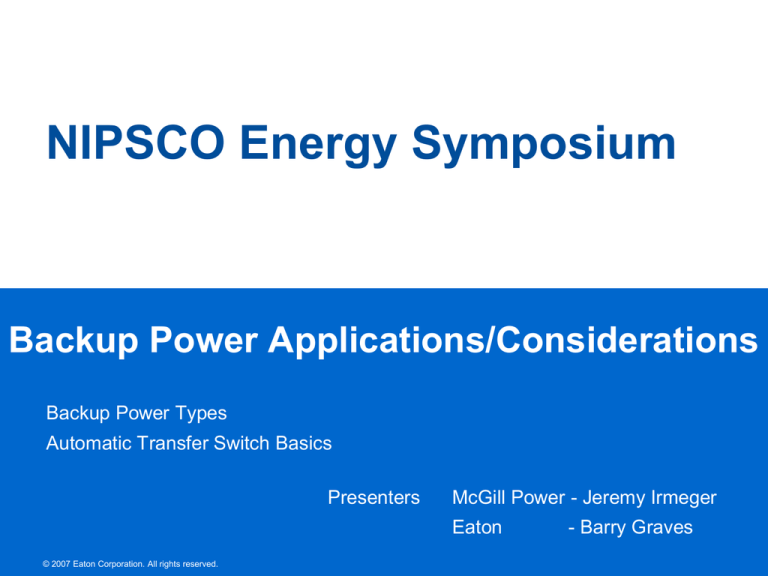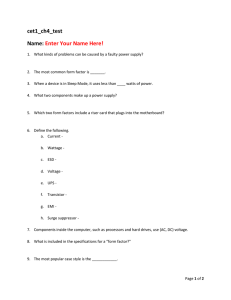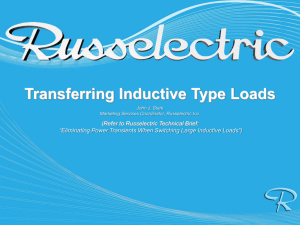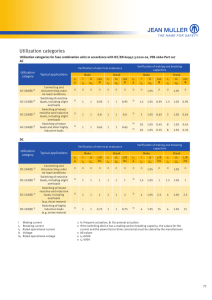
Backup Power Automatic Transfer
NIPSCO Energy Symposium
symposium
Backup Power Applications/Considerations
Backup Power Types
Automatic Transfer Switch Basics
Presenters
McGill Power - Jeremy Irmeger
Eaton
© 2007 Eaton Corporation. All rights reserved.
- Barry Graves
Objective & Agenda
Objective
•
Understanding the basics of how to
identify and properly apply UPS’s
Uninterruptible Power Supplies) and
ATS’ (Automatic Transfer Switches) for
accommoding for seamless systems .
Agenda
•
What is a UPS
•
•
Bypass Isolation Magnum Front Access
•
UPS Types
What is a Automatic Transfer Switch
•
Transfer Switch Types
•
Transfer Switch Application Categories
•
Transition Types
•
Basic Components of a Transfer Switch
•
Application Considerations
Questions
The 9 Common Power Problems
Interruption
Sag
Swell
Undervoltage
Overvoltage
Line Noise
Frequency Variation
Switching Transients
Harmonic Distortion
3 (+1) Basic Types of UPS
Powerware Series 3
Standby
The Series 3 (Stand-By) UPS delivers
power protection from 3 of the most
common power problems that threaten
your equipment and data
• “Off Line”
Normal Operation
Power Failure Event
Line
Interactive
Powerware Series 5
The Series 5 (Line-Interactive) UPS
delivers power protection from 5 of the
most common power problems that
threaten your equipment and data
Buck/Boost
Powerware Series Ferro
Ferroresonant
The Series Ferro UPS delivers
galvanic isolated power protection from
8 of the most common power problems
that threaten equipment and data
• “+1”
Interruption
Sag
Swell
Undervoltage
Overvoltage
Harmonic
distortion
Line
noise
Switching
transients
Powerware Series 9
On Line
• “Double
Conversion”
(
The Series 9 (On-Line) UPS delivers
power protection from all 9 of the most
common power problems that
threaten your equipment and data
Frequency
variation
What is a UPS System?
Maintenance Bypass Panel
System Input
System Output
To PDU
N.O.
DC
AC
AC
UPS Power
Module
Battery Cabinet
1.
Double Conversion
2.
Online System
How Much Downtime is Acceptable?
Power Availability
Equivalent Power Disruptions (yr)
99.9999999%
99.999%
99.99%
99.9%
ISPs,
e-Business,
Communications,
Electronics mfg.
N+ Redundancy
< 3 seconds
Food Processing
Server Operating Systems
Generators and Some UPS
Hospitals, Airports
Generator Only
Residential Homes
Typical Grid Power
5.3 minutes
0.88 hours
8.8 hours
Automatic Transfer Switch
A device which transfers electrical loads between two
sources of power by using either manual or automatic
controls.
UTILITY
UTILITY
LOAD
GENERATOR
UTILITY
Bypass Isolation Transfer Switch
•
An automatic transfer switch with an
additional bypass isolation switch
•
Provides ability to perform maintenance of
the main transfer switch power device,
without interruption of power to the load
•
Applied in high reliability applications:
•
Provides emergency power to life safety
and other critical loads
Transfer Switch Types
• There are only two ways to transfer power:
• Automatic
• If loads are very critical, an automatic transfer switch would
probably be used insure the fastest possible transfer.
• Non-Automatic (manual, or electrically operated)
• If loads are not quite as critical, but still cannot go for any
extended period of time without power, a Non-Automatic or
manual transfer switch could be used.
Non-automatic vs Manual Transfer
• Electrically operated non-automatic transfer
switches. The switch electrically transfers power when a
pushbutton, usually mounted on the switch’s enclosure, is pushed.
If necessary, the switch can also be manually operated.
• Manually initiated, Electrically operated
• Manually operated transfer switches provide all the
mechanics to effect the transfer from source to source. The actual
transfer of power, however, is by true hand operation of the
transfer switch.
• Manually initiated, Manually operated
•
Application
Category
NFPA 70 - National Electric
Code
• Article 700 - Emergency
Systems
• Article 701 - Legally
Required Standby Systems
• Article 702 - Optional
Standby Systems
NFPA 70
• Article 708 - COPS
• Article 517 - Health Care
Facilities
National Electric Code
•
NFPA 99 - Health Care Facilities
•
NFPA 110 - Emergency &
Standby Systems
•
NFPA 20 - Fire Pumps
•
NFPA 70E – Workplace Safety
Article 700
Emergency
Systems
Application examples
include any system
where a power
interruption would
create life safety or
health hazards.
Must automatically
transfer in 10
seconds
Shall be listed for
emergency use (UL
1008 only).
Shall supply only
emergency loads.
Article 701
Legally
Required
Application examples
include any system
where a power
interruption would
create hazards or
hamper rescue or fire
fighting operations.
Must automatically
transfer in 60
seconds
Shall be listed for
emergency use (UL
1008 only).
Article 702
Optional
Systems
Application examples
include any system
where a power
interruption would
cause discomfort or
disrupt a process.
Automatic/manual
transfer. No transfer
time requirement.
Allows for option as
such as:
• Go to neutral
position
• Auto/Manual
Selector switch
Article 708
COPS
Application examples
include emergency
call centers
ATS labeled for use
on emergency
systems.
No requirement for
transfer time.
Transfer equipment
separate from other
emergency, legally
required, or optional
loads.
Must include
provisions for roll-up
generator if using
one generator.
Transfer Switch Transition Types
© 2007 Eaton Corporation. All rights reserved.
Open Transition
• Also called a “break-before-make” switch. One set of contacts opens
before the other set closes
• There is a definite break in power as the load is taken off one source
and connected to another.
• This is the most common and least expensive
Normal
TS N
Loads
TS E
Emergency
Delayed Transition
• Break Both Sides – Delayed Transition
• One set of contacts opens before the other
• The other set of contacts delays in closing
• Load is disconnected from power during all transfers
Normal
Loads
TS N
TS E
Emergency
Delayed Transition
• Time delay neutral
• Requires a 3 position mechanism
32a
• Timed delay in the neutral position, typically 0-120sec
• 3 sec is typically a good starting point
• Load Voltage Decay
• Senses back emf voltage
32b
• Will pause in neutral position until regenerative voltages are
at
10-30%
• On Eaton transfer switches option 32 cannot be
reprogrammed in the field. A new controller must be
purchased.
Closed Transition
Normal
Loads
TS N
TS E
Emergency
100 m/secs
overlap-time
Closed Transition
• Closed Transition is also called a “make-before-break” switch.
• There is no interruption in power to a critical load when using this
type of switch.
• Both power sources are connected to the load before the break
occurs.
• Parallels the loads for < 100ms
• The two power sources have to have the same voltage and
frequency and be synchronized for the switch to transfer.
• Permits the periodic testing of an emergency source, such as a
generator, without interrupting power to the loads
Consideration for selecting
Transition Types
• When transferring two live sources, abnormal motor inrush current
can occur leading to possible damage of motor windings, insulation,
couplings and in some cases, the load itself.
• Inrush currents are caused by the motor’s residual voltage being out
of phase with the voltage source to which it’s being transferred.
• Methods of control are:
• Open Inphase transfer
• Motor load disconnect control circuit
• Delayed transition - Time Delay Neutral, Load Voltage Decay
• Closed transition – less than 100 ms paralleling of sources
Open In-phase Transfer
32f
• Feature that allows a live transfer between two sources only when
the phase difference between the two is near to zero.
• This feature prevents in-rush currents from exceeding normal starting
currents in the case where motor loads are being transferred
• How it works:
• Monitor samples the relative phase angle between the two sources being
transferred
• When the two sources are within the desired phase angle different and
are approaching zero phase angle difference, the inphase monitor
signals the transfer switch to operate.
• The operating time of the transfer switch is key in utilizing an inphase
monitor (must transfer in less than ten cycles)
• In-phase monitor and VFD’s do not work well together, use TDN.
In-phase doesn’t give the VFD’s time to reset.
Motor Load Disconnect Control
Circuit
• Selected motor loads are de-energized
during transfer operation
• Controller signals contact to open
approx. 3 seconds prior to transfer,
thus de-energizing selected loads.
• Loads are turned onto the generator
after a designated time delay.
• Loads can be turned on at one time or
sequentially so as to not block load the
generator.
• Motor load disconnect works well
when the generator is sized at the min.
45
Automatic Transfer Switches - Main Components
© 2007 Eaton Corporation. All rights reserved.
Transfer Switch Main Components
An automatic transfer switch (ATS) is made up of several main
components
Controller –
•
Continually monitors the condition of the power sources
•
Initiates start command to backup generator,
•
Initiates transfer and retransfer to good power source
Power switching device
•
Power device rated to transfer the load to/from the power sources
Control Power Transformer panel
•
Supplies operational power to the switching device/controller
Main Components - Controller
In an ATS, the controller is basically the “brains”
of the ATS, that contains all the logic/intelligence
to initiate the switching. The controller performs
following functions:
•
Senses the source voltage and frequency
•
Sends a start command to the back up
power if the main source is lost.
Commercial ATC-300+
Controller
Main Components – Switching Device
The switching device is the main power device that transfers the load
from one power source to another. The switching device includes the
main power device and the transfer mechanism. The ATS controller
tells the switching device when to make the transfer/retransfer to a
good source
Two basic types of switching devices:
•
Contactor
• Specifically designed contactors to perform load transfer between
to AC sources. Transfer switches do not use motor starting/lighting
type contactors.
•
Molded Case/Power Case Switch
• A molded case or power case circuit breaker without and /or with a
trip unit. Used when a circuit requires a compact, high capacity
disconnect device.
Main Components –
Contactor Switching Device
Contactor based
•
The contactor switching device includes the main power assembly and
the operating mechanism.
•
The power assembly is composed of the individual power poles.
•
The operating mechanism includes the solenoid and the mechanical
interlock.
Moving
Contact
Source 2
Bus
Power Assembly
3 Pole Contactor
Source 1
Bus
Load Bus
Single Power Pole
Operating Mechanism
Main Components –
Molded Case or Power Case Circuit Breaker Switching Device
Molded Case or Power Case Circuit Breaker Based
•
The molded case/power case circuit breaker switching device is a circuit
breaker without and/or with the overcurrent trip. The switching device is
composed of two separate power devices. One device is for closing on source
1 and the other for closing on source 2. The operating mechanism includes
the motor operator.
3 Pole Molded Case Switch
Power Assembly
3 Pole Power Case Switch
Power Assembly
Source 1
Device
Motor
Operating
Mechanism
Source 2
Device
Motor
Operator in
Power Case
Switch
Main Components –
Transformer Panel
Control Power
• Provided by small Control Power Transformers –CPT- connected to the
normal and the emergency source. The good source then provides the
control power needed for the ATS to properly operate.
•
Provided with a multi tap primary allowing the CPT to be used on different
voltage applications permitting a simple field change from one voltage to
another.
Basic Information for ATS Selection
When selecting a Transfer Switch, review the following:
– Types of load to be transferred
– Transition type
– Open In phase, Delayed, Closed Transition
– Application Type
– Life Safety, Emergency, Optional
– Switch Ratings
– Voltage rating, Phase, # poles
– Continuous Current rating/amps
– Overload and fault current withstand ratings
– Configuration Type
– Service Entrance
– Bypass Isolation
UPS and ATS Basics
Questions?



